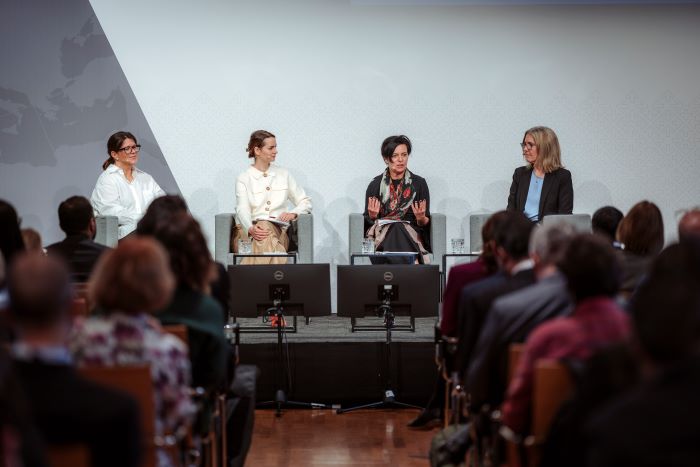As Europe grapples with growing labour shortages, particularly in specialised fields like ICT, energy, and renewables, small and medium-sized enterprises (SMEs) are facing an uphill battle in attracting and retaining international talent. At a recent expert panel held during ICMPD’s Vienna Migration Conference, moderated by Jennifer Tangney, Senior Project Manager, Migration Partnership Facility, speakers discussed the current state of labour migration and the private sector’s role in shaping a more efficient, inclusive system.
Participants from various sectors, including legal firms, multinational companies, and the European Commission, provided insights into the policy gaps and opportunities in the EU labour migration framework, particularly for SMEs. This article outlines the key takeaways from the discussion and sheds light on where improvements could bridge the labour migration divide for smaller businesses.
The Growing Demand for Skilled Workers
Europe’s workforce demands are set to surge, with projections suggesting the need for an additional 20 million ICT professionals by 2030. While multinational corporations have the resources to streamline international hiring, SMEs often struggle with bureaucratic hurdles and the financial burden of navigating complex visa processes. One of the panelists highlighted that 75% of EU-based SMEs report difficulties in hiring suitable talent, particularly for roles requiring technical skills. Meanwhile, a recent EU Barometer reveals that SMEs not only face heightened costs and time-consuming processes but often lack institutional support to facilitate global recruitment.
Modernising EU Immigration Systems
One of the key themes was the necessity for streamlined, digital immigration systems to support efficient global hiring. Jennifer Tangney emphasised that SMEs would benefit from reduced administrative barriers and faster visa processing, a sentiment echoed by Bianka Debussche Valkovicova from the European Commission’s Directorate-General for Employment. The Commission has introduced a range of initiatives that are under negotiation, including the Talent Pool and Talent Partnerships, aimed at bridging skills gaps and enhancing the EU’s attractiveness for skilled workers. These programmes aim to simplify recruitment by linking employers with potential employees from outside the EU, while providing support mechanisms, especially for smaller member states and SMEs.
However, there remains a clear divide in the applicability of these frameworks to SMEs. Large-scale employers benefit from sponsorship agreements that aren’t accessible to most SMEs. Consequently, many SMEs must turn to traditional recruitment and visa processes, which are often lengthy and unpredictable. The modernisation of immigration systems, with a focus on cost reduction and digitisation, could be “a game-changer”, especially for industries undergoing green and digital transformations, which require specialised skill sets.
Addressing Gaps in Public and Private Sector Partnerships
While the EU has made strides with legislative proposals for talent acquisition, more needs to be done to ensure the support structures are tailored to SME needs. Antoons underscored the importance of public-private partnerships, especially in aligning SME-specific requirements within the Talent Pool initiative. Many EU policies suit larger corporations, whilst SMEs struggle with insufficient support for areas such as family integration, work permits for spouses, and accessible information about the recruitment and settlement processes.
A promising model emerged from discussions around “recognised sponsorship” agreements, which have been effective for larger businesses. Extending such frameworks to SMEs could significantly enhance their global talent acquisition efforts. Further, engaging social partners in policy discussions can ensure that migration processes are aligned with the unique needs of SMEs, enabling more equitable access to international labour.
Retention: A Long-Term Investment for SMEs
Retention is as challenging as recruitment for SMEs. According to Lucja Kalkstein, Co-Founder of Eryk, long-term investment in training and integration is key for ensuring migrant workers stay and thrive within an organisation. Her company’s experience with recruiting from Nigeria highlighted the importance of cultural onboarding, providing housing support, and building a sense of community for foreign employees. The Migration Partnership Facility (MPF) TechPro for Europe pilot has also demonstrated that local partnerships and in-depth onboarding are essential for successful retention, creating a competitive advantage for SMEs that choose to invest in these practices.
To retain talent, SMEs must address both professional and personal needs of migrant workers. This includes accessible housing, social support, and structured career pathways. Simple measures, such as facilitating social networks within the workforce, can lead to significant improvements in retention, particularly for workers who may be far from home and unfamiliar with the local culture.
Socio-Economic Integration: Beyond Employment Contracts
The panel highlighted that employment is only part of the integration equation for migrant workers. Bianka Debussche Valkovicova pointed to the “Union of Skills” concept, which envisions a unified EU approach to skills recognition, aimed at reducing administrative barriers and ensuring easier access to social services for international hires. A comprehensive integration approach would consider not only employment but also community engagement, family support, and access to housing and healthcare.
The European Social Fund+ and the Action Plan for Integration and Inclusion have been instrumental in supporting integration efforts for migrant workers, yet the need for a multi-stakeholder approach persists. Effective integration requires close cooperation between public authorities, employers, and community organisations to address social and economic needs, creating a supportive environment that goes beyond the workplace. In fact, the EC is cooperating with social partners and improve coordination between migration and employment authorities through the Labour Migration Platform.
Future Avenues for the EU and Member States
In closing, Debussche Valkovicova outlined the EU’s strategic priorities for labour migration over the next five years, emphasising the need for a “single market” approach to talent mobility. Recognising the limitations in Europe’s attractiveness compared to destinations like Canada and the U.S., the EU is pursuing initiatives to simplify administrative processes, particularly for SMEs. The Skills and Talent Mobility Package is expected to bring significant improvements, with streamlined labour market testing and reduced barriers for employers.
Looking ahead, the European Commission plans to intensify collaboration between migration and employment authorities, recognising that a unified policy can better address the labour market’s demands. As SMEs play a crucial role in the EU’s economy, creating a supportive environment for international recruitment will require sustained commitment at both national and EU levels.
The path to a more effective labour migration framework in the EU is both challenging and promising. For SMEs, overcoming recruitment and retention hurdles requires a mix of policy support, public-private cooperation, and a commitment to holistic integration. By addressing the unique challenges faced by SMEs, the EU can unlock new opportunities for labour migration, ensuring that smaller employers remain competitive in an increasingly globalised talent market. As Europe progresses towards a “Union of Skills,” the migration landscape could transform, fostering a more inclusive, responsive system that meets the diverse needs of businesses and workers alike.
Related articles
Five dimensions of mobility schemes: lessons from MENTOR II
Creating business opportunities between Belgium and Senegal

